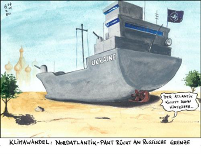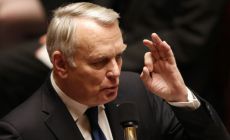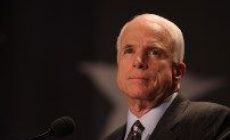NATO Summit Conclusion: Implications for Eastern Europe, Ukraine, and Russia
![]()
 From 8-9 July 2016, the annual NATO Summit was held in Warsaw, Poland. During this two day conference NATO members and its partners discussed international security, cyber defense, the continued war in Afghanistan, the migrant crisis in Europe, and the Ukraine conflict. Perhaps the most important part of the summit was the joint collaboration agreement between NATO and the EU. But overall, given the fact that various conflicts and tensions have risen in recent memory, the NATO Summit demonstrated that the alliance is still strong and will look out for its members and partners. But what were the details that were discussed during these meetings? And what are the conclusions that can be drawn from the event?
From 8-9 July 2016, the annual NATO Summit was held in Warsaw, Poland. During this two day conference NATO members and its partners discussed international security, cyber defense, the continued war in Afghanistan, the migrant crisis in Europe, and the Ukraine conflict. Perhaps the most important part of the summit was the joint collaboration agreement between NATO and the EU. But overall, given the fact that various conflicts and tensions have risen in recent memory, the NATO Summit demonstrated that the alliance is still strong and will look out for its members and partners. But what were the details that were discussed during these meetings? And what are the conclusions that can be drawn from the event?
NATO Summit Summary
Following the collapse of the Soviet Union, NATO and its existence have often been questioned, as originally it was created to counter the influence of the Communist country (and led to the creation of the Warsaw Pact, which sought to counter NATO). As a result many argued that NATO had lost its focus. The most recent NATO Summit, however, contradicts these claims, as a legitimate agenda was established where “Europe’s collective security and territorial defense” were once again established as NATO’s primary goal. Moreover, the fact that the summit was held two weeks after ‘Brexit,’ and that it was held in an Eastern European country further outlines the fact that the organization is evolving, and that perhaps Eastern Europe could take the reins of the organization in the distant future.
As for the conference itself, the first topic of discussion was the signing of a joint EU-NATO Declaration. This declaration will allow the EU and NATO opportunities of even greater cooperation in the near future, as the security of these two organizations is intertwined. For example, the issues of national security, Russian aggression, human trafficking in the Aegean, and cyber defense all remain as priorities for both organizations. During the first day of the summit NATO and its partners also discussed cooperation between NATO and the United Arab Emirates, Georgia, and cyber defense strategies. During this discussion Britain also stated that it “would not ‘turn its back’ on European defence following the Brexit vote.” Thus, despite recent developments, it was good to see that the European members of NATO are still looking to cooperate with one another without issues.
During the second day, NATO shifted its focus from issues that its organization and the EU are facing, and instead, focused on the issues that currently trouble its partners. For example, during the first half of the second day of the conference, NATO discussed the continued war in Afghanistan. In short, the organization “reaffirm[ed its] mutual commitment to ensure long-term security and stability in Afghanistan,” in addition to deescalating the conflict, countering terrorism, and providing additional assistance to Afghan National Defense and Security Forces.
Yet for the purpose of this report, the final set of meetings scheduled at the conference, and perhaps most important of the NATO Summit, was the continued conflict in Ukraine. First, NATO reassured Ukraine of its support, in addition to condemning Russian aggression. Moreover, NATO announced that “[f]our multinational battalions of about 1,000 troop each will be stationed in Latvia, Estonia, Lithuania and Poland.” In addition, after proclaiming this declaration, it was decided that the “U.S. [would] lead troops in Poland, the U.K. in Estonia, Canada in Latvia and Germany in Lithuania.” Therefore, according to the agenda, NATO and its partners were able to fulfill their desires and further strengthened their relationship with one another. In other words, despite these troubled times the NATO alliance is still strong.
Implications for Eastern Europe
Overall, the NATO Summit will bring several benefits to Eastern Europe. First, as previously mentioned, four multinational battalions will be deployed to NATO members in the east. As a result, NATO will be strengthening its presence in Eastern Europe, something that its Eastern European members have wanted for several years. Second, given the ‘Brexit’ decision and the current EU identity crisis, it appears that Eastern Europe will not be more heavily involved in both organizations, thus making the geographical region and the countries which reside there more prominent on both accounts. As a result, while the EU is now fragmented following the Brexit decision, it appears that NATO is determined to remain unified. This is a promising sign for its future.
Implications for Ukraine
There were also promising signs for Ukraine. NATO reaffirmed its stance towards the Russian Federation, stating that it condemned the support that it provided for the separatists in Donbas, in addition to the fact that the Minsk Agreements need to be upheld. Moreover, NATO condemned the illegal annexation of Crimea. NATO then concluded these discussions, stating that it “reiterate[s its] firm commitment to further develop the Distinctive Partnership between NATO and Ukraine.” While these are statements that NATO has made in the past, it was good to see that NATO has not changed it stance on these matters. Therefore, NATO is willing to stay committed to Ukraine during its time of trouble.
NATO’s commitment to Eastern Europe also helps Ukraine, as it shows that the organization is willing to take steps in which it will counter Russian aggression. But there are many notes that the Ukrainian Government should take from the conference, despite the continued praise that Ukraine has received for fighting the separatists or that the West will take steps to counter Russian aggression. First, for example, US President Barrack Obama, who has continuously claimed that the US fully supports Ukraine, has yet to visit the Eastern European country. Second, “the prospect of [Kyiv]’s eventual membership of the U.S.-led military alliance seemed as distant as ever” following the conclusion of the summit. Third, “some in NATO and the European Union are pushing for a softer stance toward Moscow and growing impatient with what they see as sluggish progress in modernizing the economy and fighting corruption in Ukraine.” In other words, while NATO and the EU as a whole continue to praise Ukraine’s fight for freedom, there are many nations which are willing to abandon their support for Ukraine in order to better their own circumstances.
Therefore, in some ways the information portrayed at the summit could be considered as empty promises for Ukraine. Time will tell.
Implications for Russia
Following the conclusion of the summit, Russian media outlets also had their take on NATO Summit. For example, RT reported that NATO, “[t]he US-led alliance’s provocative moves at the Russian border,” which in turn is threatening the existence of Moscow. NATO is flirting with Ukraine about the possibility of it becoming a member of the military organization, which further jeopardizes the Russian Federation. And the promise of the US “resetting” relations with Russia following the election of US President Obama has not been kept. As a result, over the past several years Russia has been victimized and threatened by NATO.
Furthermore, spokespersons of Russia were shocked to see that the NATO Summit heavily emphasized the threat of Russian aggression. In their opinion, the West is doing everything in its power to demonize Russia, and that the summit should have focused more on the threat that is arriving from the Middle East and Northern Africa. Therefore, “this year’s [NATO Summit] meeting had nothing in common with collective defense,” but rather, focused on further establishing Russia as an enemy of the West.
Given these reports and analyses in Russia, it then appears that Russia will continue its current aggressive policy, as it is convinced that the West is trying to demonize it. Hence, given this mentality, it is projected that Russia will continue to make legislative and policy decisions that further contribute to its “us against the world” mentality.
Conclusions
Overall, the NATO Summit has sent mixed signals to its members and allies. On the one hand, NATO has taken further steps to unite its members and to solidify and strengthen its goals. This has become evident by creating four new multinational battalions and deploying them to Eastern Europe, a region that in the past has been deemed as unimportant. Furthermore, NATO has taken steps in order to strengthen its relationship with the EU, as many of their challenges are the same.
But in the case of the nonmember states, the summit can be seen as a bust. In the case of Ukraine, NATO has continued to promote its support for the former Soviet-state and continues to condemn Russia. Yet further action has not been taken in order to help resolve the issue, as the contact recurring theme in recent months is that the Minsk Agreements need to be fully implemented. Furthermore, in the case of Russia, its government continues to feel threatened by the presence of NATO, and by implementing four new multinational battalions and stationing them in Eastern Europe, this is likely to further aggravate, rather than deescalate, Russia’s foreign policy. And with the upcoming resignation of Britain’s Prime Minister in Autumn 201, the US presidential elections in November 2016, and the elections in France and Germany next year, the world is patiently waiting to see what will be in store.
Франція готова до переговорів з Путіним

Жан-Марк Эро
Франція готова до переговорів з В.Путіним, однак жодного політичного рішення за участю Б.Асада не буде. Наразі необхідним є відновлення переговорів для забезпечення політичного переходу на основі резолюції 2254 Ради Безпеки ООН.
Відставка генерала Флінна та відношення до Росії

Голова комітету Сенату США з питань збройних сил сенатор Джон Маккейн
Відставка генерала Флінна також викликає додаткові питання з приводу намірів адміністрації Трампа по відношенню до Росії Володимира Путіна, в тому числі, заяви президента що пропонують моральну еквівалентність між Сполученими Штатами і Росією, незважаючи на вторгнення в Україну, анексію Криму, за
Румунія проти додаткових передумов для підписання Угоди про асоціацію між Україною та ЄС

Адріан Северин (Adrian Severin), депутат Європейського парламенту, незалежний (Румунія)
Адріан Северин, депутат Європейського парламенту, незалежний (Румунія), про підписання Угоди про асоціацію між Україною та Євросоюзом:
